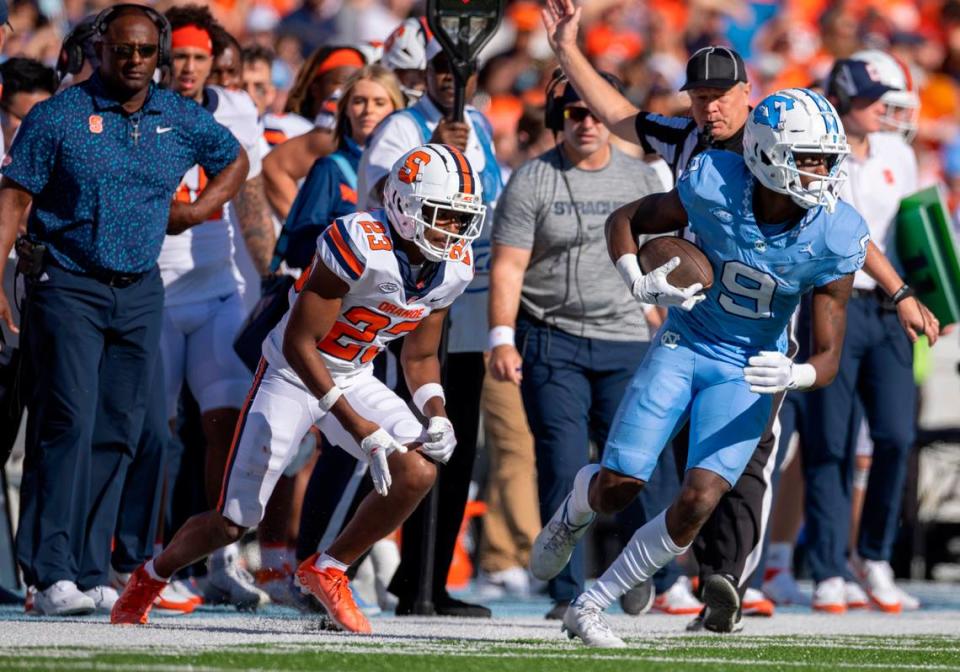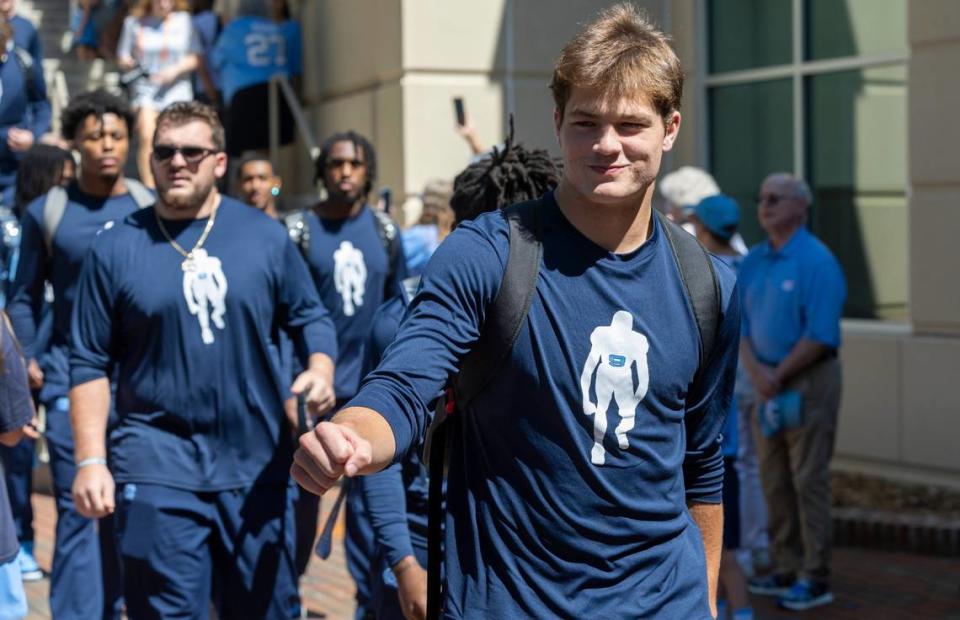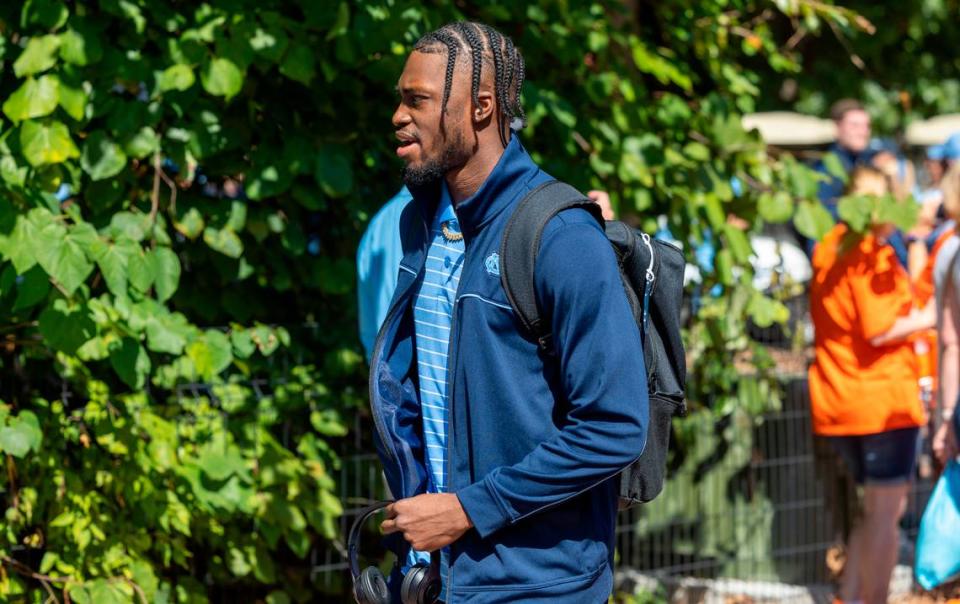Even as Tez Walker’s moment arrived at UNC, his fight again proved NCAA’s hypocrisy, futility
- Oops!Something went wrong.Please try again later.
- Oops!Something went wrong.Please try again later.
In a literal sense, Tez Walker’s moment of arrival in Chapel Hill came last January, amid much hope and anticipation that he’d continue his trajectory as a skilled college athlete. All he needed was a waiver from the NCAA, at the time thought to be a formality, and he’d be on his way as a promising wide receiver for the North Carolina football team.
Little did he or anyone else know what awaited: months of wrangling with the NCAA over his eligibility; a private fight, that eventually became public, to restore his opportunity to compete this season; a prolonged drama that compelled the North Carolina governor, and attorney general, to both voice their support of Walker and join his cause; a final NCAA denial, met with harshest of condemnation from UNC coach Mack Brown, and the university’s administration.
And then, earlier this week, a reversal that long appeared unlikely, and the NCAA’s decision, in the parlance of the social media hashtag that at times had gone viral in recent weeks and months, to “free Tez” and allow him to play. He didn’t think such a decision would ever happen, he acknowledged here on Saturday, even while others tried to keep him hopeful.
Walker had been playing on the UNC scout team and was left thinking there was “no chance that I was going to get cleared.” When the news came on Thursday that he had been, he called family back home in Charlotte to share the news, and had to move the phone away from his ear while his grandmother screamed in celebration.
For Walker, Saturday came to represent another kind of arrival. The arrival of a new beginning. Of a chance he’d long sought. Of the kind of catharsis that filled him in the moments before the Tar Heels’ game against Syracuse.

Carrying the flag
Walker, whose ineligibility cost him UNC’s first four games of the season, stood near the front of the tunnel, his teammates gathered around and behind him, before the Tar Heels ran onto the field. When they did, he carried the state of North Carolina flag — a pregame tradition at UNC, along with another player running out of the tunnel with an American flag.
There was symbolism in Walker carrying the state flag, given that he’s a North Carolina native who once longed to play at UNC, and also because of the efforts two of the most powerful people in the state had made on his behalf. North Carolina Gov. Roy Cooper wrote the NCAA last month, urging the committee charged with reviewing transfer waiver requests to approve Walker’s.
More recently, Josh Stein, the state attorney general and North Carolina’s leading Democratic candidate in the 2024 governor’s race, also wrote the NCAA. In a Sept. 26 letter to Charlie Baker, the NCAA President, Stein outlined five reasons why the NCAA should have granted Walker’s eligibility from the beginning — including concerns for Walker’s mental health “struggles,” his desire to transfer to UNC “to be closer to his family in North Carolina, particularly his ailing grandmother,” and Walker’s academics, and his 3.7 GPA at his previous school, Kent State.
Stein also strongly hinted at the possibility of a lawsuit.
“Restricting Mr. Walker from playing at UNC-Chapel Hill this fall raises serious antitrust concerns as an illegal restraint of trade,” he wrote. “In essence, the NCAA has imposed a sweeping, unilateral, one-year non-compete restriction, in violation of both state and federal law.”
It took Stein’s letter, and the efforts of five attorneys from two Triangle-firms working behind the scenes, for the NCAA to reverse course on Thursday and grant Walker his long-sought eligibility. In doing so, the NCAA claimed it had received “new information” relative to Walker’s case, and chided UNC for not sharing it sooner. Bubba Cunningham, the UNC athletics director, refuted that assertion.
For those inclined to remain skeptical of the NCAA’s motives and actions — a growing number of people these days — it was easy to surmise the “new information” it referenced was, in fact, the specter of a legal fight. And in a variety of cases in recent years, related to a host of issues affecting college athletics, the NCAA has been a consistent loser in court.

‘A big relief’
The fight for Walker — the efforts from Cooper to Stein to UNC’s Board of Trustees to Elliot Abrams, a Raleigh attorney who led his legal team — culminated in what he experienced Saturday: the arrival of a long-awaited moment. The arrival, in a sense, of freedom. After running onto the field with the state flag, Walker spent the Tar Heels’ first offensive possession on the sideline, waiting. It was a role with which he’d grown familiar in recent weeks.
As Walker’s chances dimmed of ever being able to play this season, Brown moved him to the scout team, where Walker had been practicing for weeks. Walker’s sudden eligibility created a dilemma for Brown, albeit one he was glad to encounter. Brown spent part of early Thursday afternoon trying to reach Walker to inform him of the NCAA’s decision; then the UNC coaches worked quickly to spread the news among the team.
“We didn’t want him to be overwhelmed with him just being thrown out there,” Brown said. “I don’t know if I could’ve handled it, with all the emotion. And I think he handled it so well.”
Finally, his time came on UNC’s second possession. With seven minutes, 20 seconds remaining, Walker ran onto the field at Kenan Stadium to a loud ovation. He lined up to the right of quarterback Drake Maye but still had to wait a few minutes for his first catch. That came on a 6-yard gain with about four minutes left in the first quarter.
In the stadium stands, a group of about a dozen of Walker’s family members cheered a moment they weren’t sure they were going to see, at least not this year. Among them were Walker’s mom, Ivey Cody, and grandmother, Loretta Black, who hadn’t seen Walker play in person since he was in high school in Charlotte.
“A big relief,” Cody said, “like, ‘Ahhhh,’” and she released a deep, exhaling breath.
Black, whose health problems were part of the reason why Walker wanted to transfer to a school closer to home, said she’d been “rejoicing” at the sight of her grandson on the field. Before Saturday, she’d only been able to watch his college games on television.
UNC on Saturday finished with a 40-7 victory in what was its most impressive and dominant performance of the season. Walker’s contributions were modest: six catches for 43 yards. But, after all of his receptions, UNC fans cheered as though he’d scored, or escaped defenders for a long gain. Walker’s road to reach this point, after all, was much longer than any distance he traveled on the field against Syracuse.
Tez Walker’s journey
Before arriving in Chapel Hill, he’d already endured an arduous college football journey. He planned to play at East Tennessee State after graduating from West Charlotte High, but a torn ACL derailed him. He sat out a year to recover from his injury, and enrolled at N.C. Central. There, the university canceled the 2020 season amid the pandemic, and also decided not to play in the spring of 2021.
After an academic year at NCCU, Walker arrived at Kent State. By then he was two years removed from high school but had yet to play a down of college football. He spent his first season in Kent, Ohio, as a reserve before emerging last year to become one of the most productive receivers in the Mid-American Conference.
A coaching change at Kent State was part of why Walker became interested in transferring. At the same time, he felt a need to be closer to his grandmother, who lives in Charlotte and has experienced health problems.
“I knew it would be best for me to get back home and be around my family,” Walker said in a statement UNC released in early August. “At the same time, my coaching staff left for other jobs, so it seemed like the right time for a change that would help remove the stress I was feeling.”
At issue with the NCAA was that Walker was a multi-time transfer seeking immediate eligibility. An NCAA rule mandates undergraduate athletes transferring for the second (or third) time sit out a year before competing. With a waiver, though, athletes with special circumstances can receive immediate eligibility.
Walker and UNC believed his circumstances merited such a waiver: that he suffered mental health challenges that led him to transfer from Kent State; and also that he was transferring in part to be closer to his sick grandmother.
For months, the NCAA denied Walker’s pursuit of the waiver. A final denial, last month, represented the end of the fight. At least, that is, until a UNC Board of Trustees meeting early last September, in which members discussed potential legal avenues. The trustees meeting led to the involvement of Walker’s legal team. Abrams, of the Cheshire Parker Schneider firm of downtown Raleigh, helped UNC’s successful defense of an NCAA investigation that ended in 2017.

Meaning beyond UNC
Walker’s plight resonated beyond Chapel Hill, and the concern of Tar Heels supporters, for a couple of reasons.
For one, it became difficult to understand why the NCAA granted waivers to some athletes in similar situations, but not to Walker. The denial of his waiver request felt, at best, like he’d become the victim of a bureaucratic technicality, with no uniformity behind it. At worst, it felt cruel, and as though the NCAA found Walker’s story — that he wanted to transfer closer to home because of mental health reasons, and to be closer to an ailing and aging relative — dubious.
Then there was this: College athletics has entered into a prolonged era of disruption and discontent. The pursuit of television money has turned major conference realignment into a dreadful game of musical chairs, with conferences and schools scrambling to position themselves to receive even larger paychecks than they’ve already had, for years. That chase has led to the destruction of the Pac-12, and Frankensteinian leagues comprised — or soon to be — of members with little in common other than their shared greed, and the common fear of being left behind.
Meanwhile, conference commissioners and school presidents, along with coaches, continue to complain about the effects of name, image and likeness rights, while begging for Congressional intervention. Amid all of this — the realignment and expansion and endless NIL complaints — the NCAA has stood idly by. The entire college sports enterprise is on fire, burning to the studs, and its governing body has done little to address the myriad larger problems fanning the flames.
It did, though, have the time and bandwidth to prevent Walker from playing. Again and again, and again (and again ...), the NCAA had time for Tez. As if upholding the integrity of the transfer waiver system was the most important issue facing the association and not, say, all of the other things that are tearing apart college athletics, and have been for years while the NCAA has either looked the other way or asked elected officials to fix its own problems.
On Saturday, at least one long saga reached its conclusion. The NCAA hasn’t solved, or even addressed, the larger problems ailing college sports. Its fight to keep Walker ineligible on a technicality failed, too.
Walker’s family ‘happy and grateful’
At last his moment arrived, weeks late and after a fight he never should’ve had to wage. Walker still seemed a bit shocked, afterward, that he’d made a long-awaited debut. He spoke quietly before a group of reporters, and said he felt like a weight had been lifted. Members of his family, meanwhile, waited for him outside the Kenan Football Center.
Some of them wore Walker’s No. 9 jersey, with his name on the back.
“I’m just so happy and grateful,” Walker’s grandmother said.
She said the wait had been “very tough.”
“I was stressed, myself. I was worried about him, his mental state. ... And he always puts on a smile. He never shows, ‘Is he upset?’ or anything. But it was very stressful.”
Walker’s mom had tried to maintain belief.
“We kept hope,” she said. “We always knew he was going to play” even if Walker didn’t.
The news of Walker’s eligibility arrived on Thursday a little after noon — on his mom’s birthday.
“An overjoyed feeling,” she said.
She’d attended UNC’s first four games knowing that Walker wasn’t going to play, yet hoping that maybe there was still a chance a day like Saturday would arrive. Finally, it did. She’d only been to one of her son’s Kent State games in person. Walker’s grandmother hadn’t even been able to do that.
They drove up from Charlotte on Saturday morning and it wasn’t long after when Walker arrived in the UNC locker room, the state flag waiting for him to carry onto the field.

